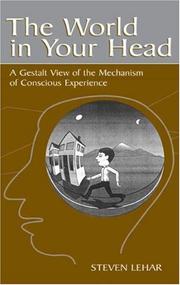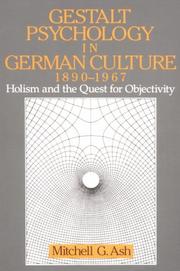| Listing 1 - 10 of 23 | << page >> |
Sort by
|
Multi
ISBN: 9173464864 Year: 2003 Publisher: Göteborg : Acta Universitatis Gothoburgensis,
Abstract | Keywords | Export | Availability | Bookmark
 Loading...
Loading...Choose an application
- Reference Manager
- EndNote
- RefWorks (Direct export to RefWorks)
Theses --- Gestalt psychology --- Configuration (Psychology) --- Form psychology --- Psychology, Structural --- Structural psychology --- Consciousness --- Ejection (Psychology) --- Knowledge, Theory of --- Perception --- Psychology --- Senses and sensation --- Psychologie de la forme
Periodical
ISSN: 25195808 Year: 1979 Publisher: [Berlin] : Sciendo, De Gruyter
Abstract | Keywords | Export | Availability | Bookmark
 Loading...
Loading...Choose an application
- Reference Manager
- EndNote
- RefWorks (Direct export to RefWorks)
Gestalt psychology --- Gestalt therapy --- Gestalt psychology. --- Gestalt therapy. --- Psychotherapy --- Configuration (Psychology) --- Form psychology --- Psychology, Structural --- Structural psychology --- Consciousness --- Ejection (Psychology) --- Knowledge, Theory of --- Perception --- Psychology --- Senses and sensation

ISBN: 3110018675 1306400090 3110828243 3111769909 Year: 2011 Publisher: Berlin ; Boston : De Gruyter,
Abstract | Keywords | Export | Availability | Bookmark
 Loading...
Loading...Choose an application
- Reference Manager
- EndNote
- RefWorks (Direct export to RefWorks)
Keine ausführliche Beschreibung für "Die Aufgabe der Gestaltpsychologie" verfügbar.
Affective and dynamic functions --- Gestalt psychology. --- Configuration (Psychology) --- Form psychology --- Psychology, Structural --- Structural psychology --- Consciousness --- Ejection (Psychology) --- Knowledge, Theory of --- Perception --- Psychology --- Senses and sensation

ISBN: 0691086141 1322884838 0691619948 0691646791 0691024529 1400868963 Year: 1969 Publisher: Princeton (N.J.): Princeton university press
Abstract | Keywords | Export | Availability | Bookmark
 Loading...
Loading...Choose an application
- Reference Manager
- EndNote
- RefWorks (Direct export to RefWorks)
Configuration (Psychology) --- Form psychology --- Psychology, Structural --- Structural psychology --- Ejection (Psychology) --- Gestalt psychology. --- Gestalt psychology --- Consciousness --- Knowledge, Theory of --- Perception --- Psychology --- Senses and sensation
Book
ISBN: 0030490715 9780030490712 Year: 1979 Publisher: New York (N.Y.): Praeger
Abstract | Keywords | Export | Availability | Bookmark
 Loading...
Loading...Choose an application
- Reference Manager
- EndNote
- RefWorks (Direct export to RefWorks)
Gestalt psychology --- Visual Perception --- 159.931 --- Visual perception --- Optics, Psychological --- Vision --- Perception --- Visual discrimination --- Configuration (Psychology) --- Form psychology --- Psychology, Structural --- Structural psychology --- Consciousness --- Ejection (Psychology) --- Knowledge, Theory of --- Psychology --- Senses and sensation --- Zien. --- Psychological aspects --- 159.931 Zien. --- Zien

ISBN: 128232649X 9786612326493 1410606546 9781410606549 9781135636593 1135636591 9780805841763 0805841768 0805841768 9780415652797 9781135636555 9781135636609 Year: 2003 Publisher: Mahwah, N.J. Lawrence Erlbaum Associates, Publishers
Abstract | Keywords | Export | Availability | Bookmark
 Loading...
Loading...Choose an application
- Reference Manager
- EndNote
- RefWorks (Direct export to RefWorks)
The World In Your Head: A Gestalt View of the Mechanism of Conscious Experience represents a bold assault on one of the greatest unsolved mysteries in science: the nature of consciousness and the human mind. Rather than examining the brain and nervous system to see what they tell us about the mind, this book begins with an examination of conscious experience to see what it can tell us about the brain. Through this analysis, the first and most obvious observation is that consciousness appears as a volumetric spatial void, containing colored objects and surfaces. This
Perception. --- Consciousness. --- Gestalt psychology. --- Configuration (Psychology) --- Form psychology --- Psychology, Structural --- Structural psychology --- Consciousness --- Ejection (Psychology) --- Knowledge, Theory of --- Perception --- Psychology --- Senses and sensation --- Apperception --- Mind and body --- Philosophy --- Spirit --- Self --- Supraliminal perception --- Cognition --- Thought and thinking --- Harmonic resonance --- Cognitive psychology
Book
ISBN: 9780199686858 0199686858 9780191766862 Year: 2015 Volume: *2 Publisher: Oxford, United Kingdom ; New York, NY : Oxford University Press,
Abstract | Keywords | Export | Availability | Bookmark
 Loading...
Loading...Choose an application
- Reference Manager
- EndNote
- RefWorks (Direct export to RefWorks)
Perceptual organization bridges the gap between the low-level building blocks of incoming sensations and the high-level interpretation of these inputs as meaningful objects, scenes and events in the world. In the visual modality, for instance, the features signaled by the neurons in low-level cortical areas must be combined in order for the high-level areas to make sense of them. But a similar functionality of perceptual organization is present in other modalities too (e.g., audition, haptics). Perceptual organization comprises a wide range of processes such as perceptual grouping, figure-ground organization, filling-in, completion, perceptual switching, etc. Such processes are most notable in the context of shape perception but they also play a role in texture perception, lightness perception, color perception, motion perception, depth perception, etc. Perceptual organization deals with a variety of perceptual phenomena of central interest, studied from many different perspectives, including psychophysics, experimental psychology, neuropsychology, neuroimaging, neurophysiology, and computational modeling. Given its crucial role in phenomenal experience, perceptual organization has also figured prominently in classic Gestalt writings on the topic, touching upon deep philosophical issues regarding mind-brain relationships and consciousness. In addition, it is of central importance in applied areas like visual art, design, architecture, music, and so forth.
Theory of knowledge --- Affective and dynamic functions --- Gestalt psychology --- Gestalt psychology. --- Visual perception. --- Optics, Psychological --- Vision --- Perception --- Visual discrimination --- Configuration (Psychology) --- Form psychology --- Psychology, Structural --- Structural psychology --- Consciousness --- Ejection (Psychology) --- Knowledge, Theory of --- Psychology --- Senses and sensation --- Psychological aspects --- E-books --- Visual perception
Book
ISBN: 3927474428 Year: 1990 Volume: 21 Publisher: Berlin : Freie Universität Berlin, Universitätsbibliothek,
Abstract | Keywords | Export | Availability | Bookmark
 Loading...
Loading...Choose an application
- Reference Manager
- EndNote
- RefWorks (Direct export to RefWorks)
Gestalt Theory. --- Gestalt Theories --- Theories, Gestalt --- Theory, Gestalt --- Gestalt psychology --- Psychologists --- Gestalt theory --- History --- Biography --- biography --- Köhler, Wolfgang, --- biography. --- Biography. --- Gestalt Theory --- Behavioral scientists --- Configuration (Psychology) --- Form psychology --- Psychology, Structural --- Structural psychology --- Consciousness --- Ejection (Psychology) --- Knowledge, Theory of --- Perception --- Psychology --- Senses and sensation --- Köhler, Wolfgang, --- Gestaltpsychologie --- Histoire

ISBN: 0521646278 9780521646277 0521475406 9780521475402 Year: 1998 Publisher: Cambridge ; New York : Cambridge University Press,
Abstract | Keywords | Export | Availability | Bookmark
 Loading...
Loading...Choose an application
- Reference Manager
- EndNote
- RefWorks (Direct export to RefWorks)
This is a full-length historical study of Gestalt psychology - an attempt to advance holistic thought within natural science. Holistic thought is often portrayed as a woolly-minded revolt against reason and modern science, but this is not so. On the basis of rigorous experimental research and scientific argument as well as on philosophical grounds, the Gestalt theorists Max Wertheimer, Wolfgang Kohler and Kurt Koffka opposed conceptions of science and mind that equated knowledge of nature with its effective manipulation and control. Instead, they attempted to establish dynamic principles of inherent, objective order and meaning, in current language, and principles of self-organization, in human perception and thinking, in human and animal behavior, and in the physical world. The impact of their work ranged from cognitive science to theoretical biology and film theory. Based on exhaustive research in primary sources including archival material, this study illuminates the multiple social and intellectual contexts of Gestalt theory and analyses the emergence, development and reception of its conceptual foundations and research programmes from 1890 to 1967
Gestalt psychology --- Psychology --- Gestaltpsychologie --- Psychologie --- History --- Histoire --- Behavioral sciences --- Mental philosophy --- Mind --- Science, Mental --- Human biology --- Philosophy --- Soul --- Mental health --- Configuration (Psychology) --- Form psychology --- Psychology, Structural --- Structural psychology --- Consciousness --- Ejection (Psychology) --- Knowledge, Theory of --- Perception --- Senses and sensation --- History. --- Geschiedenis van de psychologie --- Gestalt therapy --- Objectivity --- Holism
Book
ISBN: 3525303262 Year: 2004 Publisher: Göttingen Vandenhoeck und Ruprecht
Abstract | Keywords | Export | Availability | Bookmark
 Loading...
Loading...Choose an application
- Reference Manager
- EndNote
- RefWorks (Direct export to RefWorks)
Gestalt psychology --- Logic --- Phenomenology --- Values --- Axiology --- Worth --- Aesthetics --- Knowledge, Theory of --- Metaphysics --- Psychology --- Ethics --- Philosophy, Modern --- Argumentation --- Deduction (Logic) --- Deductive logic --- Dialectic (Logic) --- Logic, Deductive --- Intellect --- Philosophy --- Science --- Reasoning --- Thought and thinking --- Configuration (Psychology) --- Form psychology --- Psychology, Structural --- Structural psychology --- Consciousness --- Ejection (Psychology) --- Perception --- Senses and sensation --- Methodology
| Listing 1 - 10 of 23 | << page >> |
Sort by
|

 Search
Search Feedback
Feedback About UniCat
About UniCat  Help
Help News
News